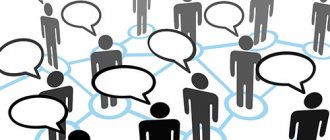A modern person strives to be successful everywhere - both at work and in his personal life. Career, family, friends - all these are components of life, and effective communication allows you to improve all areas and come to maximum agreement. Everyone should strive to improve their social skills. Even if difficulties arise initially, over time this knowledge will bring well-deserved results - reliable interpersonal connections.
Definition of communication
Different ways of transmitting information from one person to another are called communication. It includes all the variety of channels for transmitting and decoding signals and can be:
- verbal;
- non-verbal;
- written;
- pictographic;
- spatial-symbolic, etc.
Communication is considered effective when the sender of information communicates on the same wavelength as the recipient. However, even communication in a single sign system does not guarantee that the message will be correctly deciphered.
Effective communication minimizes the loss of meaning of the message. To successfully promote a business, to maintain friendships, and for a vibrant personal life, it will be useful for any person to improve their communication skills.
Habit 3: Stay in control
To communicate effectively, you need to be aware of your emotions and control them.
And this means learning to cope with stress. When you are nervous or unable to cope with your emotions, you are likely to misperceive other people, send confusing or intimidating nonverbal signals, and begin to act like an unstable, mentally ill person. How many times have you experienced a disagreement with your spouse, children, boss, friends or co-workers and then said or done something you later regretted? If you can quickly de-stress and calm down, not only will you not have to regret it later, but in many cases you will help the other person cool down as well. Only when you are in a calm, relaxed state will you be able to understand whether you need to respond in this situation or whether it is better to remain silent, as indicated by the behavior of the other person.
In situations such as a job interview, a business presentation, a stressful meeting, or introducing a loved one to family, for example, it is important to manage your emotions, think on your feet, and communicate effectively under pressure. These tips may help:
Basics of Effective Communication
Communication as a banal exchange of information is already present in the simplest animals. Man, in the process of evolution, has brought communication to perfection. Spoken and signed speech developed and gradually expanded to written, symbolic and figurative. However, this process has made understanding more difficult, and effective communication is becoming a separate object of study.
The communication process includes five elements:
- A communicator is someone who conveys information.
- Contents of the message.
- The method of transmitting information (how it is carried out).
- The audience, or recipient, is who the message is intended for.
- The final stage of communication, which allows us to understand whether effective communication has taken place. It is only possible if the previous four are sufficiently satisfactory.
Principles of Effective Communication
Without positive communication, it is impossible to achieve mutual understanding on any issue. In order to make sure that other people correctly perceive outgoing information, it is necessary to comply with a number of requirements.
First of all, you need to pay attention to the principles of effective communication:
- Communication should be two-way. When all participants are interested in the positive outcome of the conversation, and it is equal for them, the desired effect occurs.
- The recipient must make every effort to correctly perceive the message.
- The message must be clear, structured and concise.
- The recipient must trust the speaker, respect his opinion and not question his competence.
- Effective communication is always emotional, to the extent that is acceptable in a given situation.
- Patience and forbearance towards other people's shortcomings. Accepting people as they are, without trying to adjust or fix anything.
Below we will discuss the main conditions for effective communication.
Recognize the emotional content of words by training the muscles of the middle ear
By increasing the muscle tone of the tiny muscles in the middle ear (they are the smallest in the human body), you will be able to recognize higher frequencies of human speech that convey emotion and better understand the true meaning of what people are saying. Developing these tiny muscles isn't just about focusing entirely on what someone is saying; They can be trained by singing, playing wind instruments, and listening to certain types of music (high-frequency Mozart violin concertos and symphonies, for example, instead of low-frequency rock or rap).
How to achieve a positive effect from communication?
For communication to be considered effective, certain conditions must be met:
- Speech must correspond to the original purpose of the conversation and be adequate. Don't talk too much or bring up issues that have nothing to do with the topic being discussed. This improves effective communication skills.
- The words used must be logical and lexically accurate; this is very important to achieve the goal of communication. Achieved through constant self-education, reading various literature and careful attention to the native language.
- The narrative itself should be logical and competent. A clear structure of presentation creates favorable conditions for listeners and increases the chances of a positive outcome.
Developing positive communication skills
An empathic statement expresses empathy for another person.
First understand the other person's situation or feelings, and then confidently express your needs or opinions. “I know you’ve been very busy at work, but I want you to make time for us too.” Growing self-confidence can be used when your first attempts are unsuccessful. Over time, you become more decisive and assertive: your statement may communicate specific consequences if your needs are not taken into account. For example, “If you do not comply with the agreement, I will be forced to go to court.”
Start practicing assertiveness in less risky situations, which will help build your self-confidence. Or ask friends or family if they will let you practice assertiveness techniques on them first.
Elizarova Lilia Apr 09, 2018
Effective Communication Techniques
Any person lives in society and is dependent on it. Even the most desperate homebodies, perhaps not directly, but enter into interpersonal relationships. Effective communication will be useful both for work and for everyday social connections. Communication techniques and skills can be developed and improved - this will make anyone's life much easier.
Do you want to receive positivity in the process of communication? It will be useful for you to learn some techniques for increasing the effectiveness of communication:
- Learn to listen carefully to what they say. You should not just look at the interlocutor during a conversation, but also bend slightly, nod your head, and ask appropriate leading questions. This technique will allow you to understand the interlocutor’s point of view as accurately as possible.
- Be clear, concise and to the point. The more clearly a thought is formulated, the more likely it is that it will be understood and perceived correctly.
- Include in your arsenal not only verbal, but also non-verbal communication. Take the same position as the interlocutor, try to use only open gestures, and do not touch your face during the conversation.
- Watch for the emotional coloring of speech. It should be moderate, but so much so that the interlocutor understands your interest in the issue.
- Master the techniques of oratory. The ability to master your voice allows you to accelerate the development of effective communication. Clear articulation, correct timbre and adjusted volume will make any message positive.
- Master technical means of communication. Any adult must be able to use the telephone, fax, Skype, and email. Written communication skills should be developed regularly.
These are just basic techniques designed to facilitate and improve interpersonal communication.
Stay balanced in a stressful situation
Use stalling tactics to take an extra minute to think.
Before answering, repeat or ask for clarification of the statement that causes you misunderstanding. Pause to collect your thoughts. Remaining silent is not a bad thing; pausing faster than rushing to respond can force you to pull yourself together. Make one judgment and give an example or provide information that supports your statement. If your response is too long or you ramble on about everything at once, you risk losing the listener's interest. Focus on one statement with an example, look at the listener's reaction and evaluate whether there is something else worth talking about further.
[media=
https://youtu.be/ZxN65jwtoaw
]
Speak clearly and clearly. In many cases, how you speak can be just as important as what you say. Speak clearly, maintain the same timbre of voice, and make eye contact. Let your body language communicate relaxation and openness.
At the end of your statement, make a short summary and stop. Briefly state the main point of your speech and stop talking, even if there is silence in the room. Don't keep talking to fill the silence.
When a discussion gets heated in the middle of a conversation, you need to do something quickly and immediately to reduce the emotional intensity. Once you learn how to quickly reduce tension in the moment, even if you can handle any strong emotions you experience, control your feelings and behave rationally. If you know how to keep your mind balanced and engaged, even when something upsetting is happening, you can stay emotionally alert and alert.
Rules for Effective Communication
Any interpersonal communication must comply with certain standards. Their violation leads to a lack of understanding between interlocutors, conflicts and even a breakdown in relationships.
Rules for effective communication:
- Speak the other person's language. This rule should be understood as the need to take into account the level of education, social status, age and other parameters. To be heard and understood, you need to formulate your thoughts based on the characteristics of the audience.
- Prepare to communicate. If the conversation is not spontaneous, you should find out in advance who you are going to meet with and for what reason. Take visual materials and technical aids. Develop a conversation plan.
- Learn active listening techniques to help put your interlocutor at ease and better understand their point of view.
- Speak clearly, moderately loudly and confidently, do not draw out your words, but do not repeat them either.
- When writing a letter, stick to the chosen style.
- Before calling by phone or Skype, make a plan for the conversation and the issues that need to be discussed in advance.
How do you become an engaged listener?
Focus all your attention on the speaker, his or her body language, tone of voice, and other nonverbal cues coming from that person.
Tone of voice conveys emotion, so if you're thinking about something, checking text messages, or doodling on a piece of paper, you'll almost certainly miss nonverbal cues and the emotional content of the words spoken. And if the person speaking is acting in the same distracted manner, you will quickly be able to notice it. If you find it difficult to focus on some speakers, try repeating their words in your head - this will reinforce their message for you and help you stay focused. Listen with your right ear. The left side of the brain contains the primary processing centers for recognizing speech and emotions. Since the left hemisphere of the brain controls the right side of the body, focusing on the right ear can help you better diagnose the emotional content of what the speaker is saying. Try to keep your posture straight, lower your chin slightly, and turn your right ear towards the speaker - this will help you pick up the high frequencies of human speech, which carry the emotional component of what is being said.
Don't interrupt the speaker or try to shift the conversation to your problems by saying something like, "If you think this is bad, listen to what happened to me." Listening does not mean waiting for your turn to speak again. If you're forming in your head what you're going to say next, you can't concentrate on what the other person is saying. Often the speaker can read your facial expressions and understand that you are thinking about something else.
Show interest in what was said. Periodically nod approvingly, smile at your interlocutor and make sure that your body position is open and conducive to communication. Approvingly encourage the speaker to continue the conversation with small verbal comments like “yes” or “uh-huh.”
Any conversation becomes interesting if the listener is enthusiastic...
Try not to judge. To communicate effectively with someone, you don't have to like them or agree with their ideas, values, or opinions. However, to fully understand a person, you must avoid judging him and refrain from reproaches and criticism. If you conduct even the most complex discussion correctly, you can establish contact with someone with whom mutual understanding seemed very difficult and unlikely to be found.
Give us feedback. If the thread of conversation is interrupted, reproduce what was said in other words. “That's what I hear,” or “It sounds like what you're saying,” are great ways to get the conversation back on track. Do not repeat verbatim what the speaker said, it will sound forced and unintelligent. Instead, express what you understand to be the meaning of the words you heard. Ask questions to clarify things: “What do you mean when you say...” or “Is this what you mean?”
Ways to communicate effectively
To achieve mutual understanding in the communication process, it is necessary to create conditions and take into account possible methods of effective communication. There are six of them in total:
- Strive to express your thoughts as convincingly as possible. Always keep it brief and to the point, avoid unnecessary verbiage, omissions and possible double interpretations.
- Use terminology and professionalism only when they are appropriate.
- Even in everyday communication, jargon and slang expressions should be avoided, especially when it comes to intergenerational communication.
- Avoid excessive emotional stress, both positive and negative.
- Try to address yourself personally, by name, scientific or military rank, or by uniting a group of interlocutors with a generally meaningful word.
- Always follow the rules of politeness and etiquette.
Habit 4: Be Confident
Openness and self-confidence help build clear rapport, as well as improve self-esteem and make decision-making easier for you.
Being confident means expressing your thoughts, feelings, and needs openly and honestly while being able to stand up for yourself and respect others. This does NOT mean being hostile, aggressive, or picky. Effective communication is about understanding the other person, not about winning an argument or pushing your opinion on others. To increase self-confidence:
- Value yourself and your abilities. They are just as important as someone else's.
- Know your needs and desires. Learn to express them without violating the rights of others.
- Express negative thoughts in a positive way. It's okay to be angry, but you also need to show respect for others.
- Take comments towards you positively. Accept compliments graciously, learn from your mistakes, ask for help when you need it.
- Learn to say no. Know the limits of your patience and don't let others take advantage of you. Look for a way out of the situation so that everyone is happy as a result.
It is much better not to believe in a person, but to be confident in him. Stanislav Jerzy Lec
Nonverbal cues to improve communication
The interlocutors perceive each other not only by ear. Verbal impact can be increased or decreased by a variety of nonverbal cues. Our body sends them out in large quantities, and other people read and interpret them on a subconscious level.
To improve your communication skills, it will be useful to master positive nonverbal reinforcement techniques:
- Always be clean and tidy: even if your clothing does not exactly match the dress code, the overall impression of the conversation will be positive.
- Try to control your facial expressions and emotions. Facial expression should be neutral-positive and react with changes depending on the flow of the conversation.
- Avoid touching your face during a communicative act - this is subconsciously perceived as an attempt to cover your mouth, and accordingly, your statement is false.
- Learn to “mirror” the body position of your interlocutor. It is important to do this delicately, without excessive zeal, so as not to look like a caricature.
- Avoid “closed” poses – crossed arms and legs. This body position indicates an unpreparedness for effective communication. While open palms and a friendly smile can win over any interlocutor.
Techniques for improving communication effectiveness at work
Ensure an effective onboarding process
Starting a new job can be challenging, especially for those who work remotely. Now more than ever, it is important to have detailed training materials and documentation to help new employees get up to speed quickly. The easier you make it for people to access important information from the start, the better communication in the workplace will be. It is useful to assign a mentor to a new employee during the onboarding period.
Be clear about work processes and remove obstacles
Did you know that 57% of employees say they were not given clear direction on their work? You can improve these statistics by clearly indicating the steps required to complete each task and project.
Likewise, you should have a step-by-step checklist to overcome obstacles should they arise. This will set expectations about what needs to be done, how to do it correctly, and will promote better communication in the workplace.
3. Establish trusting and open relationships with colleagues
Establishing trust takes time, but it is worth constantly strengthening and it takes communication in the workplace to a whole new level. Trust strengthens your relationships with your colleagues, allowing you to interact better and thrive as a team. Try to get to know each other's interests, likes and dislikes in order to build comfortable communication.
Have regular one-on-one meetings
Regular communication with colleagues ensures productive work and helps to communicate more effectively in the workplace. Take time to discuss projects, gather employee feedback, and engage in open-ended conversations.
When your employees are working remotely, it's important to keep in touch with colleagues and share information to ensure a smooth workflow. It is useful to use task tracking programs to understand how much time employees spend on project tasks.
A one-on-one format can be a more comfortable environment for honest discussion. Effective communication in the workplace is important, but honesty should not be overlooked. If you're the leader of a remote team, here are some helpful tips:
- Don't cancel meetings. This can be detrimental to your team's morale.
- Make sure your online meeting and calling software is up to date and reliable. Whether it's a video conferencing tool or a VoIP system, you need to make sure that your meetings are not interrupted on a regular basis.
- Come prepared and have an agenda. There's nothing worse than wasting time chatting for 15-30 minutes without a clear plan for what you need to get out of your team.
Listening and paying attention is essential for effective communication in the workplace.
Listening is much more than just hearing. Only 7% of communication is verbal, while a whopping 55% of communication is actually body language. Pay attention to facial expressions, tones and body language to understand what message is being conveyed. By honing your communication skills in the workplace to capture both nonverbal and verbal communication, you can undoubtedly become a more effective communicator.
Being an active listener also means that you have to pay full attention when someone is speaking. Ask questions, give feedback, and try to be an active participant in every conversation at work.
6. Be open to both positive and negative opinions
One of the best things you can do at work is to be open to feedback - both positive and negative.
Feedback will always be emotionally charged, but it will allow you to see your strengths and weaknesses. You need to listen carefully to everyone who wants to express their thoughts in a comfortable atmosphere without any consequences.
A great solution is to give employees the opportunity to leave anonymous reviews to make it easier for them to express their thoughts.
You can collect two types of reviews:
- Qualitative feedback : Ask your team what you and the organization can do to improve their workplace experience. These are text responses that can give you deeper insight.
- Quantitative feedback : Collect metrics such as internal Net Promoter Score (NPS), which measures happiness on a scale of 1 to 10. These responses are based on numbers that allow you to analyze satisfaction each quarter.
Maintain an open door policy
An open door policy is important to strengthen workplace communication and build trust within an organization, but it's not always easy. Encouraging your employees to have honest conversations with their bosses is a net benefit for your company, but some may be hesitant to share their findings. It is important to convey to employees that it is okay to express their thoughts, and this is the basis of effective communication in the workplace.
Host team activities to boost morale
To avoid burnout on your team, give yourself and others the necessary time to recuperate. Organize fun activities that will not only help reduce stress, but will also allow your team to bond with each other and create fond memories.
Shared experiences improve relationships with each other on your team, leading to stronger communication in the workplace.
9. Use modern unified communication tools
Your workplace probably uses many forms of communication: phones, messaging apps, email, video conferencing tools, etc. With so many channels, messages can easily get lost in the information environment. You need to choose an easy-to-use communication tool that meets all the needs of your business processes.
Take a deep dive into business project management tools to track your team's performance from start to finish. This allows you to find bottlenecks in business processes and look for solutions to optimize them.
If you're already using a variety of project management tools and platforms, exploring app integrations can improve productivity and improve communication in the workplace.
Learn about diversity, equity and inclusion
Research shows that Gen Z and Millennial employees now care more about diversity, equity and inclusion efforts than previous generations, and they want evidence that companies are taking steps to make the workplace more inclusive.
Be sure to educate yourself and your team on DEI. This should spark critical conversations and frank discussions that will promote better communication in the workplace and make it more inclusive.
Learn to talk better on the phone
Colleagues are always pleased to communicate with a good interlocutor who knows how to win over his opponent over the phone. Not every company has the latest communications software or collaboration tool. In large companies, most communication is still carried out by telephone.
Phone conversations can be difficult because it is impossible to see the other person's facial expression or body language. Changing your tone to match will help you communicate your thoughts more effectively.
Learn to write better emails
In addition to other communication skills in the workplace, pay special attention to email writing. Email has been and will continue to be an important part of communication in the workplace. Thus, it is important to learn to express your thoughts in a form that is easy to understand. Writing concise, clear emails will make it easier for your team to understand their responsibilities and projects, and will save everyone time and energy that can be spent on other tasks.
Take your time, use bulleted lists, and avoid ambiguous phrases. Plus, you can always unsend the email and adjust it with extra time.
Practice public speaking
Public speaking is one of the most important communication skills in the workplace. If you can't speak clearly in front of a group of people, you'll have a hard time communicating your thoughts and results effectively.
If you're wondering how to improve your communication skills at work, public speaking is one way to go. Start by speaking in front of the people you are most comfortable with to gradually build your confidence.
Understand each other's strengths and weaknesses
Everyone has areas in which they excel and areas in which they can improve their skills. By identifying each other's strengths and weaknesses, you can also fine-tune your workflow and communication in the workplace. Exchange of information in this vein will give your team a synergistic effect and have a positive impact on productivity.











